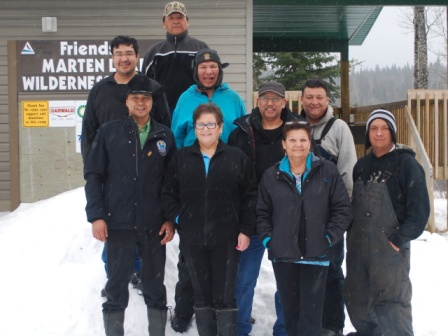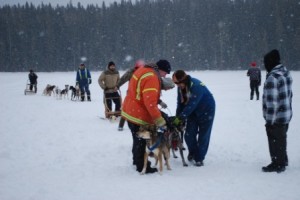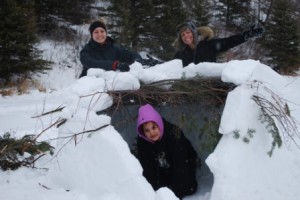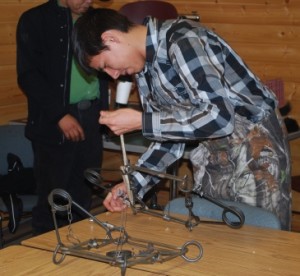High school students from Little Buffalo School, Atikameg School and Cadotte Lake School stepped out of a classroom environment to experience land-based learning at the Marten Lakes Wilderness Campus near Slave Lake. The Winter Camp was organized through the Kee Tas Kee Now Tribal Council (KTC) and Northland School Division Partnership Agreement.
Over a four day period from February 17- 20, 19 students stayed in cabins to gather knowledge, develop relationships and build self-confidence. Jason Bigcharles, KTC Outdoor Education/Cree Culture Specialist says the camp is designed to help students acquire life-long learning skills to achieve success.

Back Row: Derrik Stick; Middle Row: Kevin Lewis, Elvis Crookedneck, Billy Joe Laboucan, Lubicon Lake Band Chief, Clifford Sticks
Front Row: Jason Bigcharles, Kee Tas Kee Now Tribal Council, Delores Pruden-Barrie, Director of FNMI Education, Northland School Division, Joyce Hunt, FNMI Coordinator, Northland School Division, Kelly Sticks. Article by Curtis Walty
“Not only do we want students to be successful but we want them to become leaders,” said Bigcharles. “We want them to take initiative and to not be afraid to step outside of their comfort zone.”
Blake Muskwa, a grade 12 student from Little Buffalo School, demonstrated examples of stepping outside the comfort zone. He volunteered to set up an animal trap while students and teachers were watching with curiosity and gave dog-sledding a whirl on Marten Lakes.
“This entire camp is full of new experiences and really takes you out of your limits,” said Muskwa. “My first time dog-sledding was at this camp. “I got on the dogsled and about 10 metres after going I was like why I am here, what is going on? Just doing one loop with the dogs taught me a lot.”
Dog-sledding, one of many activities covered at the camp, was organized by Kevin Lewis, a Cree Language, Culture and Literacy Instructor.
“The first day we focused on taking care of the canines,” said Lewis.
Students collected the know-how about proper nutrition for dogs and the type of exercise they need. On day 2, students stepped onto Marten Lakes to try their hand at dog-sledding.

Colin Mackay, Little Buffalo School Teacher (left) and Kevin Lewis (right), make sure everything is ready to go.
“We showed the students how to harness the dogs and then drive the dogs,” said Lewis. “We started with four dogs and upped it to six.”
Lewis adds he was pleased to see students demonstrate respect for the dogs, patience for dog-sledding and determination to finish the job.
In addition to dog-sledding, Elders, educators and community members shared wisdom in areas such as meal preparation, ice fishing, snow-shoeing, building survivor shelters, trapping, hand games, Cree Language development, story-telling and traditional art.

Kayley Van Schaik, CTS Teacher (left), Celeste Anderson, Grade 11, Atikameg School (right), and Shenatah Cardinal, Grade 11, Cadotte Lake School build a quinzhee.
A common theme students shared throughout the camp was feeling a sense of pride for learning something new and making new friends. That train of thought was echoed by Little Buffalo School student Amy Williams.
“This camp made me more comfortable around people,” said Williams. “Everyone started to talk and become friends on the first day.”
When it comes to measuring student success for these camps, Bigcharles says it is important to see student engagement.
“So far the feedback from students has been excellent,” said Bigcharles. “What I have seen in past camps is that students will want to stay and not go home. When I did a camp with Grouard Northland School, students had to do a report based on the camp. It was neat to go into the school and see the write ups on the wall, see feedback and see the school integrate literacy.”
Bigcharles adds that the long term goal for these camps is to continue the work to develop assessment tools to support literacy and numeracy and educational outcomes related to the curriculum.
Muskwa shared a final thought for all students who are curious about land-based learning.
“This camp is something I highly recommend,” said Muskwa. “It’s a great experience, great place to stay and a great place to get away.”
Click here for more information about Northland School Division No 61.
by Curtis Walty



Be the first to comment on "NSD61 students experience Kee Tas Kee Now Tribal Council Winter Camp"